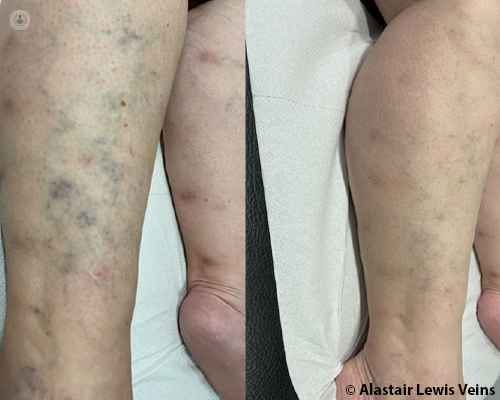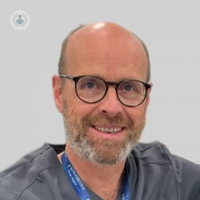Everything you need to know about varicose veins
Written by:Around 75 per cent of the adult population in the UK and Ireland will suffer from venous disease in their lifetime. Varicose veins account for the largest section of those patients.
Mr Alastair Lewis, leading minimally invasive venous surgeon who exclusively specialises in the treatment of varicose veins, discusses this common condition in expert detail.

What are varicose veins?
They are bulging rope-like cords of veins which can occur anywhere on the legs. This is either the front or back, from the groin to the ankle. They tend to cause a lot more symptoms than spider veins or thread veins. This is because they allow blood to fall backwards towards the ankles increasing the pressure in tissues of the lower parts of the leg.
What causes varicose veins?
A number of risk factors will allow veins to develop more rapidly in people who are prone to develop problems. These include:
- Pregnancies
- Prolonged standing
- Lifestyle
- Smoking
- Body weight
The most important risk is family history and unfortunately some people are just very good at developing varicose veins. Most patients inherit the tendency to form varicose veins from one or both parents.
What problems do varicose veins cause?
Varicose veins often cause symptoms in the affected leg. This commonly include
- Aching/heaviness
- Itching
- Numbness/tingling
- Cramps/Night cramps/restless legs
A number of signs may be evident that tend to signify that the vein disease is at risk of progressing
- Spider veins, especially around the ankles
- Ankle swelling that is worse on the leg with more varicose veins
- Skin discoloration, especially around the ankles
- Bleeding veins and ulcers are fortunately much less common
If you suffer from any of these symptoms or signs and have visible veins, a consultation is highly recommended.
What treatment options are available?
The good news is that no one should be undergoing surgery in the modern age of varicose vein treatment. Two main keyhole methods are used to treat both the veins and the underlying problem that has led to their development.
Endovenous laser therapy (or EVLT)
Often, EVLT is the best method to treat varicose veins. The procedure is performed on an outpatient basis. There is no need for hospital stays or general anaesthetics and a full return to normal activity is possible later that day. The procedure is performed under local anaesthetic on a walk-in walk-out basis and takes around 45 minutes in the day procedure unit.
Ultrasound guided foam sclerotherapy
This method is used to treat all the veins that can’t be managed with EVLT. Ultrasound guided foam sclerotherapy is used to identify and access all the hidden veins that are causing problems. A special foam is injected to kill off the veins. It’s then absorbed by the body in minutes so, nothing is left behind. These procedures are performed in an outpatient appointment which lasts around 30 minutes. Normal activity can resume immediately.
I’ve had surgery before; can I still get treatment?
Yes. Both methods mentioned above are ideal to manage both recurrent veins and the hidden veins which have caused them to return.
Will I require surgery if my varicose veins are really bad?
No. No-one should be having surgery in the modern era. Keyhole procedures are vastly more effective and avoid the need for what would be a more complex operation.
What are the alternatives to invasive procedures for varicose veins?
Good quality, well-fitting compression stockings will control the symptoms of varicose veins and reduce the rate that veins progress. They will also reduce the risk of developing more serious complications of veins such as blood clots or skin damage. Unfortunately, they aren’t easy to wear all year round and instead, addressing the underlying venous disease is very beneficial.
What are the risks of not having treatment?
Slowly, varicose veins get worse if they are left untreated. Existing veins become larger, bulge more and new varicose veins appear elsewhere.
Symptoms also become more troublesome as veins get larger. The good news is that only five per cent of sufferers are likely to go on to develop the more troublesome complications of varicose veins.
If you’d like to arrange a consultation with Mr Lewis, visit his Top Doctors profile or send an email to [email protected] or book in directly at one of the clinics. New consultation slots are available every week.


